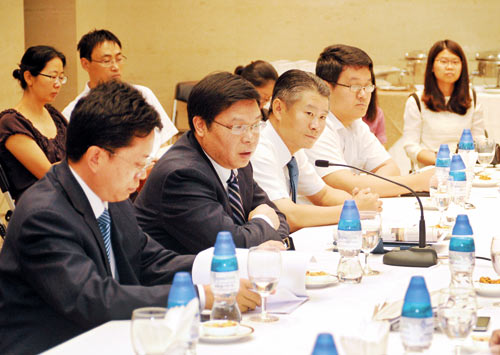China doesn’t use Sri Lanka to threaten any other country’s security, asserts new Chinese Ambassador
China has no intention of using Sri Lanka to threaten any other country’s security, Yi Xianliang, the new Chinese Ambassador to Sri Lanka asserted to journalists in Colombo on Tuesday adding that India is a friendly neighbour and partner of China.
Trilateral cooperation among China, Sri Lanka and India will benefit the three nations and three peoples, he quoted Chinese Foreign Minister Wang Yi as saying at a meeting with his Sri Lankan counterpart Mangala Samaraweera in Beijing recently. While stressing that India, like Sri Lanka, is a friendly neighbour and partner of China, the new ambassador told a media briefing at the embassy that as an important component of China’s friendly policy toward neighbouring countries, the China-Sri Lanka relationship is never targeted at or influenced by any third party.
His comments came on the eve of a visit to Sri Lanka by Indian Prime Minister Narendra Modi, the first by an Indian leader in more than two decades.

With a controversy breaking out over the Colombo Port City project, Chinese embassy officials have started a new dialogue (more open than before) with Sri Lankan media. Here the new Chinese ambassador (second from left) flanked by embassy staff explain to reporters why the controversial project needs to be re-started. – Pic by Amila Gamage
The Chinese ambassador said he was shocked by misleading comments on a Chinese submarine docking at the Colombo Port for logistical replenishment last year. Actually, the Chinese submarine came to Colombo Port on its way to and back from the Gulf of Aden and waters of Somali coast to carry out escort missions for the merchant vessels of both Chinese and other countries.
The dockings was a regular port call for replenishment of supplies and was a common practice of navies of all countries. It was transparent and received prior approval by the Sri Lanka government, he added.
He revealed that he was the Chinese Governor to the Asian piracy-combating agreement body–ReCAAP before he came here.
He also worked with Governors from Australia, Bangladesh, Brunei, Cambodia, China, Denmark, India, Japan, Korea, Laos, Myanmar, Netherlands, Norway, the Philippines, Singapore, Sri Lanka, Thailand, the UK, the US and Vietnam for years. “We had a close cooperation in combating piracy,” he added.
The Chinese government is hopeful that the review of the stalled Colombo Port City project by the Sri Lankan Government would be completed as soon as possible, Mr. Xianliang pointed out.
The contractor, China Communications Construction Company has gone through due procedure and has followed all its legal obligations, he revealed during a briefing at the embassy.
He urged both the government and the Chinese company concerned to observe the rule of law and keep mutual trust and confidence in each other in the implementation of the project.
The construction of this project will provide a great impetus to the urban development of Colombo, local economic development and the improvement of Sri Lanka’s national image, he said.
This project will be of great significance for Sri Lanka’s economic development, especially attracting foreign investment and promoting local tourism and therefore all matters should be sorted out maintaining close relations between the two countries, he emphasised.
Mr. Xianliang noted that the embassy hopes to maintain close contacts with the media to disseminate credible information on Chinese-aided projects, trade and investment in Sri Lanka
Mr. Xianliang who assumed office two weeks ago, shared with the Sri Lankan journalists his first impression about Sri Lanka and its people, the successful cases of China-Sri Lanka practical cooperation, as well as his vision for the future development of the bilateral relations.
Referring to the government’s decision to re-schedule Chinese loans, he said that against the backdrop of the global financial crisis in 2008, major donors reduced their preferential loans to Sri Lanka. China also faced difficulties at that moment.At the request of the government of Sri Lanka, China overcame the difficulties and increased financial support to Sri Lanka fully following the principle of mutual benefit and win-win results.
The loan arrangements, which are made upon consensus and oriented towards the entire nation and its people, have played a great positive role in Sri Lanka’s economic and social development. In fact, interests of both governmental and commercial loans from China are reasonable and of the same level to all other countries which received such loans, he added.
Chinese Commercial Counselor, Wang Ying Gi noted that China’s EXIM Bank and China Development Bank provided these loans under terms and conditions agreed upon by the two sides and therefore a re-scheduling of such loans would not arise.
He noted that some technical or practical problems and challenges emerging between China and Sri Lanka should be resolved through friendly bilateral consultation.
Referring to many cases of successful cooperation between the two sides, he disclosed that shortly after the internal conflict ended in 2009 in Sri Lanka, the engineers of the China National Aero Technology International Engineering Cooperation (CATIC-ENG) risked their personal security to enter the Northern province to survey the road condition even though the land mines were still not cleared.
The A9 highway was completed by CATIC-ENG within 28 months, and halved the travelling time between Jaffna and central Sri Lanka.
The Colombo International Container Terminal (CICT) built by the China Merchants Holdings International Company (CMHI) and the Sri Lanka Ports Authority with Chinese company’s investment of around Rs. 71.5 billion has handled 680,000 containers in 2014, enhancing the total capacity of the Port of Colombo by 14 per cent, the fastest growth among the world’s ports last year.
The Norochcholai Coal Power Plant which was constructed by CMEC of China is now generating over 50 per cent of total electricity in Sri Lanka, he disclosed.


